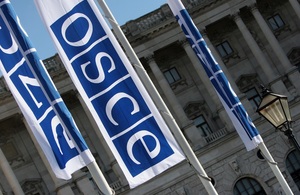World Press Freedom Day: UK statement
Ms. Nicola Murray, Deputy Head of the UK Delegation to the OSCE, speaks about the importance of safeguarding media freedom in the OSCE region.

OSCE
Madam Chair,
World Press Freedom Day on the 3 May celebrated 30 years of the Windhoek Declaration, which was a landmark statement on media freedom. That Declaration outlines the fundamental importance of fostering and defending free, independent media in building strong open, democratic societies.
The words from Windhoek in 1991 were echoed later that year in Moscow, when all OSCE participating States recognized “that independent media are essential to a free and open society and accountable systems of government and are of particular importance in safeguarding human rights and fundamental freedoms.”
Unfortunately, as we mark the 30th anniversary of the Windhoek Declaration and the OSCE commitments agreed in Moscow in 1991, we must acknowledge there are too many violations of media freedom across the OSCE region. We have discussed many of them in the Permanent Council over recent months. Next week, the Representative on Freedom of the Media (RFoM) will undoubtedly highlight some of her concerns.
As OSCE participating States, it is important that we continue to consider how we can help safeguard media freedom in our region. That means calling out violations of media freedom – both in public, including in OSCE fora, and in our bilateral exchanges. It also means supporting the important work of the RFoM, by engaging with the concerns she raises, and ensuring her Office is adequately funded.
The UK has a long history of the media holding the powerful to account. In the UK, we recognise the importance of journalists being able to do their job to the best of their ability without fear or favour. We also recognise that too many journalists working in the UK today face both abuse and threats to their personal safety.
That is why the UK published on 9 March this year our first ever National Action Plan for the Safety of Journalists, which was delivered through collaboration between representatives from government, journalism, policing, and civil society.
This Plan acknowledges there is work that we must do in order to fully understand the scale of the problem, but also recognises there is already much that can be done to begin to tackle the problem. We hope, in the weeks and months ahead, to share our experiences of agreeing and adopting our National Action Plan.
Madam Chair,
The World Press Freedom Index is a valuable tool for evaluating media around the world and tackling the threats faced by journalists. The UK looks closely at its findings, and works with its authors at Reporters Without Borders to advance media freedom and safeguard journalists in the UK and overseas. In the recently published Index for 2021, the UK moved up from position 35 to 33.
Whilst we are pleased that efforts to improve the situation in the UK have been recognised by RSF in compiling the index, we realise there is absolutely no room for complacency. So whilst determined to protect and promote media freedom globally, the UK also recognizes its own shortcomings and is committed to improving our domestic media environment.
Thirty years on from the discussions in Windhoek and Moscow, the UK remains steadfast in supporting the principles enshrined in the texts from those meetings, and championing freedom of expression and media freedom in the OSCE region.
Thank you